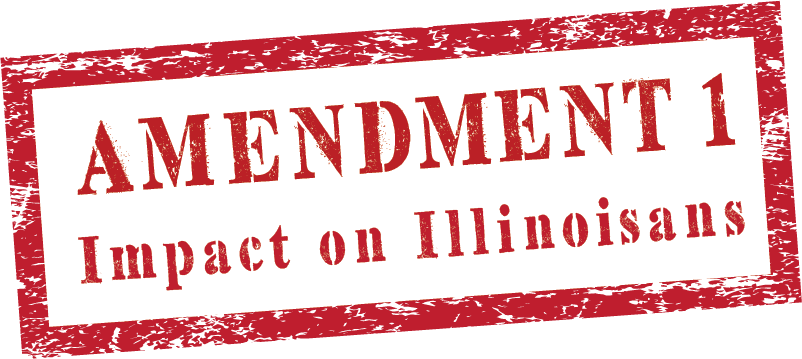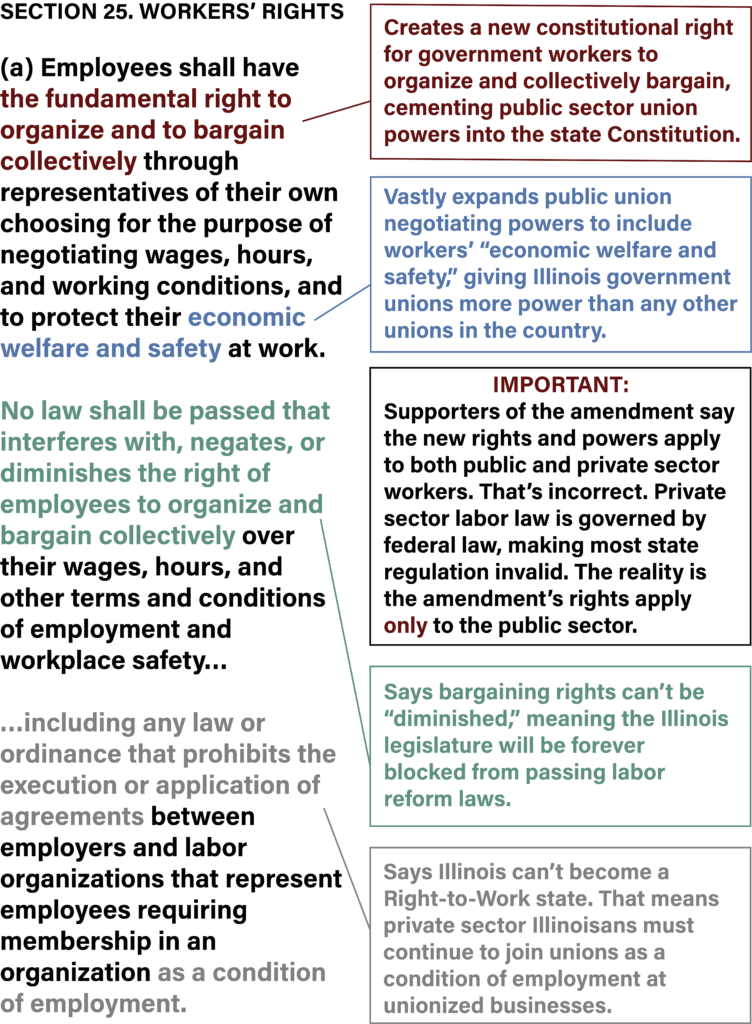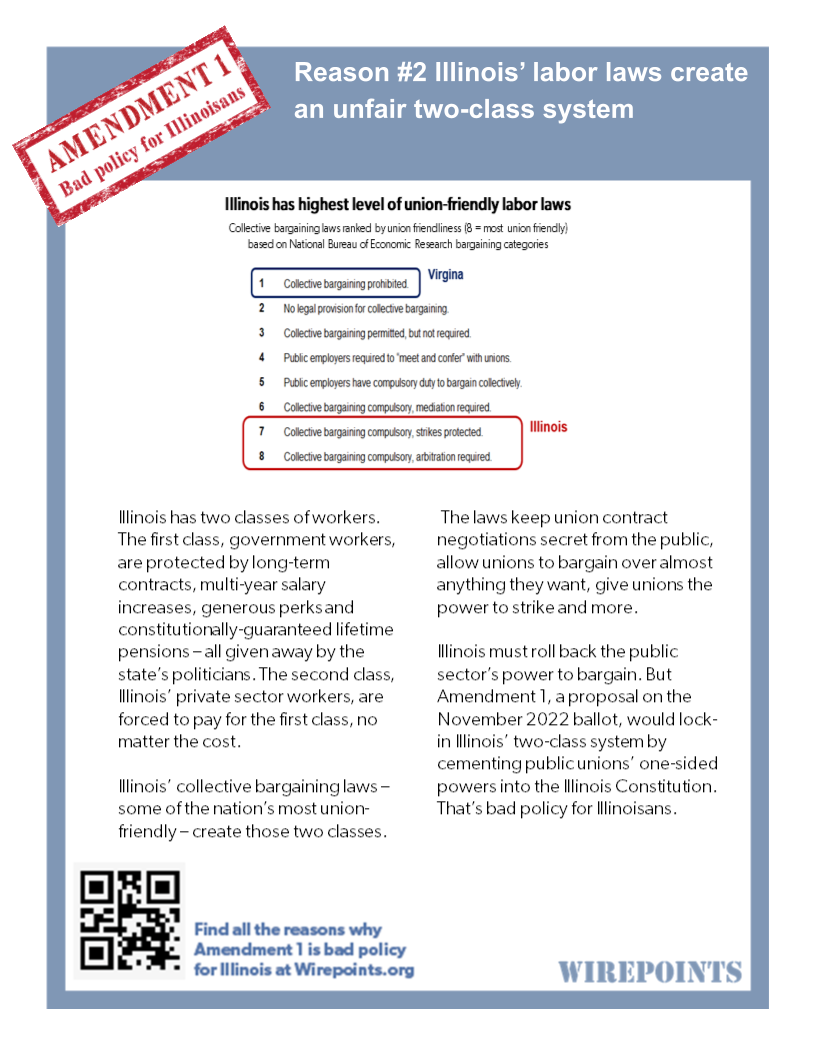
If you care about property taxes, parents’ rights or union powers – and the future of Illinois – you should care about Amendment 1.
Amendment 1, which Illinoisans approved on November 8, has given the state’s public sector unions the strongest powers in the country and blocked Right to Work for the private sector.
Official Vote Total for Amendment 1
Yes: 2,212,999
No: 1,555,929
Amendment 1 Language
Below is the amendment language added to the Illinois Constitution, along with a short explanation of what different sections mean.
Note: If the amendment had failed, workers wouldn’t have lost any of their existing rights.

Arguments For and Against
Proponent Arguments for Amendment 1:
Click + for more details
Illinois already offers public sector workers some of the nation’s strongest labor protections – but they are laws, not constitutional provisions. Amendment 1 would cement into the Illinois Constitution the right to organize and bargain – on par with rights like freedom of speech and freedom of religion.
The amendment’s constitutional changes would make Illinois government unions the strongest in the country, giving them more power to fight for higher compensation, more social justice programs and the tax hikes to pay for them.
Under Amendment 1, Illinois would provide the strongest powers in the country to public sector labor unions. Illinois would leapfrog Hawaii, Missouri and New York – the only other states that have collective bargaining as a right in their constitutions – by (1) confirming collective bargaining as a “fundamental” right; (2) expressly listing the items that can be collectively bargained, and (3) preventing lawmakers from passing laws that diminish organizing and bargaining rights. No other state has rights like that in their constitution.
Lawmakers wouldn’t be able to “diminish” government worker bargaining rights ever again. Amendment 1 would give government union rights ultimate protection under the law, similar to the way the Illinois Constitution’s “pension protection clause” protects public pensions from changes.
Illinois will become the first state in the nation to constitutionally protect the items over which public sector unions can negotiate: e.g., wages, hours, other terms and conditions of employment and more.
Currently, lawmakers have the power to strip unions of the issues they can bargain over. For example, between 1995 and 2021 the General Assembly allowed the Chicago Teachers Union to bargain only over salaries and benefits. Amendment 1 would block lawmakers from ever again stripping a public sector union of its full negotiating abilities.
Illinois will be the first state to protect in its constitution the terms “economic welfare” and “safety” as subjects of collective bargaining. Both terms will vastly expand what public unions can officially bargain over, granting them far more control over government policy.
For example, the Chicago Teachers Union tried to make the expansion of affordable housing an issue during its 2019 contract negotiations with Chicago Public Schools. Under Amendment 1, the union could potentially demand such policies as DEI curriculums or sexualized education be included as provisions of its members’ employment contract.
Amendment 1 will make sure government workers are even better compensated for their role as public servants. Illinois government workers have already secured benefits such as the 2nd-highest salaries of any state workers in the nation, heavily-subsidized health insurance, perks like salary spiking and pension pickups, free retiree health insurance, and more. Amendment 1 would help further increase those salaries and benefits by vastly expanding public union negotiating powers.
The amendment would help teachers unions push back against parent and community attempts to block DEI curriculums and national sexual education standards in Illinois. It would also ensure such policies and curriculums would be implemented without interference.
Amendment 1 would block Right-to-Work laws from ever being passed in Illinois. That means private sector Illinoisans will continue to have to join unions as a condition of employment at unionized businesses. Under the Amendment, that requirement will be cemented into the constitution, protecting union power and influence in perpetuity.
Opponent Arguments against Amendment 1:
Click + for more details
Illinois would become the nation’s extreme outlier when it comes to giving government unions power over taxpayers. No other state constitution protects bargaining, creates unprecedented government worker rights and blocks Right to Work like Amendment 1 would.
Illinoisans already pay the nation’s highest property taxes – more than double what residents in Missouri and Indiana pay and triple what Kentuckians pay.
With government unions able to bargain over their “economic welfare and safety” and lawmakers unable to “diminish” bargaining rights under Amendment 1, Illinoisans can count on their property taxes to rise even faster than they have in the past.
Covid revealed just how few rights parents have in K-12 education. Amendment 1 would erode parents’ rights even further, especially when it comes to DEI curriculums, the politicization of classrooms and imposing sex ed in Illinois schools.
For example, expanded bargaining rights covering “economic welfare and safety” means teacher unions could negotiate an issue like sexuality education into their contracts with no way for parents or lawmakers to stop it.
Amendment 1 would enshrine private sector workers’ status as second-class citizens. Public sector union powers and benefits include multi-year labor contracts, guaranteed raises and the power to strike, as well as salary spiking, pension pickups, free retiree health insurance, and more. Ordinary Illinoisans don’t get such benefits, but they are forced to pay for those public sector benefits no matter what.
Amendment 1 would forever block laws that “interfere with, negate or diminish” public union collective bargaining rights, meaning lawmakers wouldn’t be able to pass labor reforms that could lower the cost of government and cut Illinoisans’ property tax bills. Even if lawmakers try, count on unions to tie up anything they don’t like in the courts. No state in the country bans lawmakers from passing labor law reforms like Amendment 1 would.
Illinois’ experience with public pensions provides the perfect example why locking in the public sector’s labor powers and benefits is harmful. In 1970, Illinois lawmakers added a “pension protection clause” to the state constitution, which, similarly, protects public sector retirement benefits from being “diminished or impaired.” Every attempt at structural pension reforms since then has been blocked. As a result, each Illinois household is now on the hook for $110,000 in state and local pension debts, part of the nation’s worst pension crisis.
Illinois’ current labor laws already give public sector unions some of the strongest powers in the country. But Amendment 1 would go even further by putting collective bargaining into the Illinois Bill of Rights – equal to that of freedom of speech and religious freedom.
Illinois labor laws already force governments to negotiate over wages, hours, and other terms and conditions of employment. Amendment 1 would add those subjects of bargaining into the constitution, protecting them from any future attempts at reform. No state in the nation cements subjects of bargaining in their constitution like that.
On top of that, adding the terms “economic welfare” and “safety” as bargaining subjects will give unions essentially limitless bargaining power.
Illinois already has one of the nation’s worst business climates. The state needs to become far more competitive if it hopes to lure businesses, jobs and entrepreneurs here. But Amendment 1 would damage Illinois’ economic competitiveness by blocking Right-to-Work laws. That means private sector Illinoisans, whether they want to or not, must continue to join unions as a condition of employment at unionized businesses.
Illinois would become a national outlier by blocking Right to Work. Almost all of Illinois’ neighbors – as well as a majority of the nation – have expanded worker choice and worker freedom by becoming Right-to-Work states.
Amendment 1: Fact Sheet
Wirepoints created a fact sheet for Amendment 1 to assist you in engaging others in discussion regarding this important matter.

Download the fact sheet CLICK HERE
For more information from Wirepoints on Amendment 1 CLICK HERE
For Amendment 1 information from third-party sources CLICK HERE
How Lawmakers Voted on Amendment 1
Senate Vote
May 21, 2021
Passed 49 to 7
Yes: 38 Democrats | 11 Republicans
No: 0 Democrats | 7 Republicans
| 38 YES DEMOCRAT | Stadelman (D) |
| Aquino (D) | Villa (D) |
| Belt (D) | Villanueva (D) |
| Bennett (D) | Villivalam (D) |
| Bush (D) | Mr. President (D) |
| Castro (D) | |
| Collins (D) | 0 NO DEMOCRAT |
| Connor (D) | |
| Crowe (D) | 11 YES REPUBLICAN |
| Cullerton (D) | Anderson (R) |
| Cunningham | Bryant (R) |
| Ellman (D) | Curran (R) |
| Feigenholtz (D) | DeWitte (R) |
| Fine (D) | Fowler (R) |
| Gillespie (D) | McClure (R) |
| Glowiak Hilton (D) | Rezin (R) |
| Harris (D) | Rose (R) |
| Hastings (D) | Stoller (R) |
| Holmes (D) | Syverson (R) |
| Hunter (D) | Wilcox (R) |
| Johnson (D) | |
| Joyce (D) | 7 NO REPUBLICAN |
| Koehler (D) | Bailey (R) |
| Landek (D) | Barickman (R) |
| Lightford (D) | McConchie (R) |
| Loughran Cappel (D) | Plummer (R) |
| Martwick (D) | Stewart (R) |
| Morrison (D) | Tracy (R) |
| Muñoz (D) | Turner, S.(R) |
| Murphy (D) | |
| Pacione-Zayas (D) | 3 NOT VOTING |
| Peters (D) | Jones, E. (D) |
| Simmons (D) | Turner, D. (D) |
| Sims (D) | Van Pelt (D) |
House Vote
May 26, 2021
Passed 80 to 30
Yes: 71 Democrats | 9 Republicans
No: 0 Democrats | 30 Republicans
| 71 YES DEMOCRAT | Meyers-Martin (D) | 30 NO REPUBLICAN |
| Ammons (D) | Moeller (D) | Butler (R) |
| Andrade (D) | Morgan (D) | Batinick (R) |
| Avelar (D) | Moylan (D) | Bennett (R) |
| Buckner (D) | Mussman (D) | Bos (R) |
| Carroll (D) | Ness (D) | Bourne (R) |
| Cassidy (D) | Nichols (D) | Brady (R) |
| Collins (D) | Ortiz (D) | Chesney (R) |
| Conroy (D) | Ramirez (D) | Demmer (R) |
| Costa Howard (D) | Robinson (D) | Durkin (R) |
| Crespo (D) | Scherer (D) | Elik (R) |
| Croke (D) | Slaughter (D) | Frese (R) |
| D’Amico (D) | Smith (D) | Friess (R) |
| Davis (D) | Stava-Murray (D) | Grant (R) |
| Delgado (D) | Stoneback (D) | Halbrook (R) |
| DeLuca (D) | Stuart (D) | Jacobs (R) |
| Didech (D) | Tarver (D) | Mazzochi (R) |
| Evans (D) | Vella (D) | Meier (R) |
| Flowers (D) | Walker (D) | Miller (R) |
| Ford (D) | Walsh (D) | Morrison (R) |
| Gabel (D) | West (D) | Murphy (R) |
| Gong-Gershowitz (D) | Williams, Ann (D) | Niemerg (R) |
| Gonzalez (D) | Williams, Jawaharial (D) | Reick (R) |
| Gordon-Booth (D) | Willis (D) | Sommer (R) |
| Greenwood (D) | Yang Rohr (D) | Sosnowski (R) |
| Guerrero-Cuellar (D) | Yednock (D) | Spain (R) |
| Guzzardi (D) | Yingling (D) | Swanson (R) |
| Halpin (D) | Zalewski (D) | Ugaste (R) |
| Harper (D) | Mr. Speaker (D) | Weber (R) |
| Harris (D) | Wilhour (R) | |
| Hernandez, Barbara (D) | 0 NO DEMOCRAT | Windhorst (R) |
| Hernandez, Elizabeth (D) | ||
| Hirschauer (D) | 9 YES REPUBLICAN | 3 PRESENT |
| Hoffman (D) | Haas (R) | Davidsmeyer (R) |
| Hurley (D) | Hammond (R) | Ozinga (R) |
| Jones (D) | Keicher (R) | Wheeler (R) |
| Kifowit (D) | Lewis (R) | |
| LaPointe (D) | Luft (R) | 5 ABSENT |
| Lilly (D) | Marron (R) | Caulkins (R) |
| Mah (D) | McCombie (R) | McLaughlin (R) |
| Manley (D) | Severin (R) | Stephens (R) |
| Mason (D) | Welter (R) | Burke (D) |
| Mayfield (D) | Rita (D) |
Frequently Asked Questions
Q. Amendment 1 proponents recently ran ads featuring a private sector healthcare worker at a children’s facility who says the amendment “will protect us as we stand up for our patients.” Does Amendment 1 impact private sector workers or public sector workers, or both?
A. As written, the rights granted by Amendment 1 apply to public-sector workers only. Private sector workers are excluded because they are covered by federal labor laws – which preempt Illinois’ state laws and its constitution. The lead Senate sponsor of Amendment 1, Sen. Ram Villivalam (D-Chicago) admitted that, telling fellow lawmakers “as federal labor law stands today, the amendment could not apply to the private sector.”
However, though federal law preempts most state labor laws regarding the private sector, the federal government does allow states to choose the Right to Work status of their private sector.
********************************
Q. Currently, issues open to bargaining in Illinois are limited to such things as wages, hours, working conditions, workplace safety and other terms and conditions of employment. But Amendment 1 gives workers a new right to collectively bargain over issues of “economic welfare” and “safety at work.” What impact will that have on unions’ bargaining powers?
A. Proponents and opponents of Amendment 1 both agree that including the phrases “economic welfare” and “safety at work” will expand unions’ negotiating powers to cover anything related to safety or the economy.
For example, the state’s official informational pamphlet on Amendment 1 (see below) states it “will protect workers from being silenced when they call attention to food safety threats, shoddy construction, and other problems that could harm Illinoisans” [Emphasis added]. The state is expressly stating that Amendment 1’s language applies to union demands respecting their view of the general public’s interest – basically, political demands of any kind. That’s a vast expansion of unions’ current negotiation powers that, again, will result in endless litigation.
********************************
Q. Will the words “of their own choosing” from the line “Employees shall have the fundamental right to organize and to bargain collectively through representatives of their own choosing for the purpose of negotiating” have a major impact on who can collectively bargain in Illinois?
A. Wirepoints believes the vague wording of phrase “of their own choosing” could end the exclusive bargaining power of Illinois’ unions. Currently, when an Illinoisan takes a unionized job, they are forced to join the pre-existing union and must let the union represent them in contract negotiations. But this new language could give any two workers the right to create their own union to represent their interests.
Amendment pamphlet
The state will mail voters a pamphlet which contains the proposed constitutional amendment language and a summary of arguments for and against the amendment.
For Wirepoints’ analysis of the arguments contained in the pamphlet, Click Here.
PROPOSED AMENDMENT TO ADD SECTION 25 TO ARTICLE I OF THE ILLINOIS CONSTITUTION
That will be submitted to the voters November 8, 2022
ARGUMENTS IN FAVOR OF THE AMENDMENT
This amendment will protect workers’ and others’ safety. That includes guaranteeing nurses’ right to put patient care ahead of profit and making sure construction workers can speak up when there’s a safety issue. It will protect workers from being silenced when they call attention to food safety threats, shoddy construction, and other problems that could harm Illinoisans. This amendment protects firefighters and EMTs who put their lives on the line to protect Illinoisans. It means they get the training and safety equipment they need to do their jobs, and can speak out when they see a problem without fear of retaliation. This amendment will help our economy by putting more money in workers’ pockets who join together and get raises. That will mean more money going into our communities and small businesses as people join the middle class with good-paying jobs.
ARGUMENTS AGAINST THE AMENDMENT
A fundamental right provided to all citizens under the First Amendment of the United States Constitution is the right to free speech and freedom of association. This amendment prohibits any law or ordinance that allows union workers to choose whether they wish to be a member of the union or not. Under the 2018 United States Supreme Court decision Janus v. Illinois AFSCME, non-union government workers cannot be required to pay union dues as a condition of working in the public sector. Approval of this constitutional amendment will deny that protection to private sector workers. The amendment also states that lawmakers could never “interfere with, negate, or diminish” certain rights. These terms are broad and undefined and leave lawmakers without the ability to clarify through legislation. Our Illinois Constitution provides such protection to public employees. The result of that protection has been to squash efforts by state lawmakers and voters to address Illinois’ pension fund deficits.
